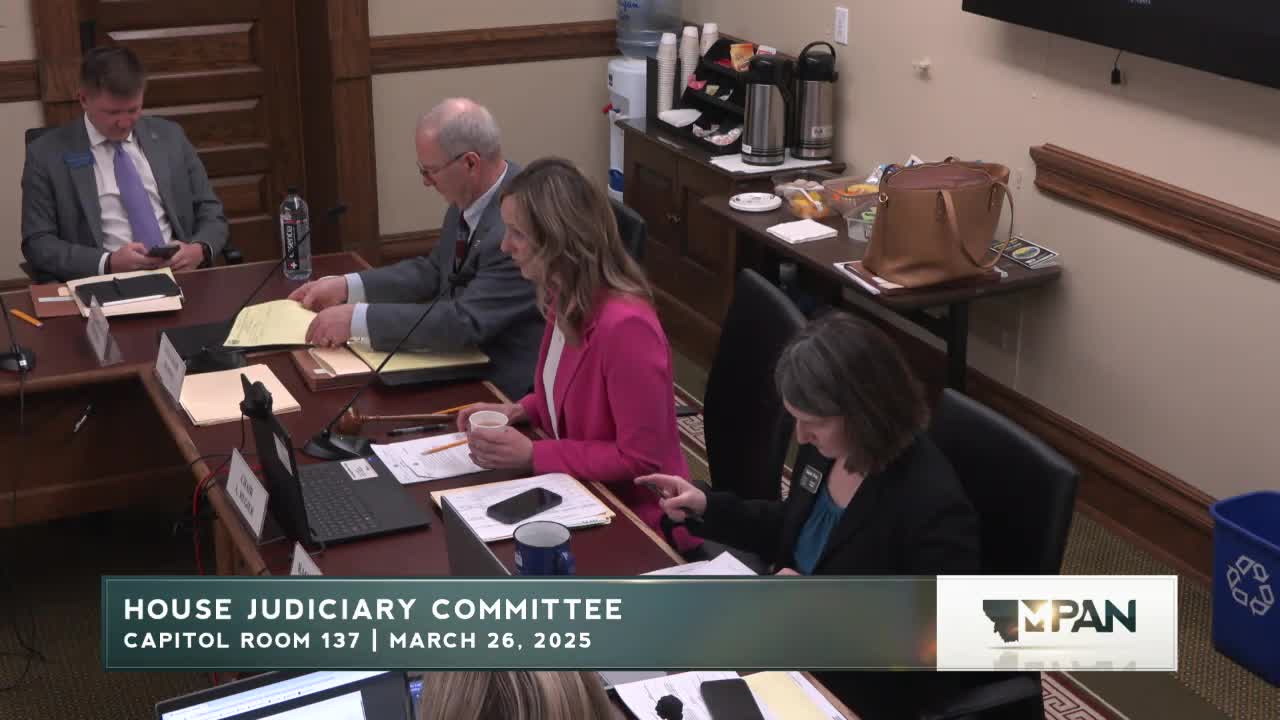Montana hearing draws hours of testimony on bill to define ‘male’ and ‘female’ in state law
Get AI-powered insights, summaries, and transcripts
Subscribe
Summary
Senate Bill 4 37, which would add statutory definitions for terms including “male,” “female,” “man,” “woman,” “mother” and “father,” drew more than an hour of testimony before the House Judiciary Committee and divided witnesses along ideological, medical and legal lines.
Senate Bill 4 37, which would add statutory definitions for terms including “male,” “female,” “man,” “woman,” “mother” and “father,” drew more than an hour of testimony before the House Judiciary Committee and divided witnesses along ideological, medical and legal lines.
Sponsor Sen. Carl Glynn opened the hearing by saying the bill’s purpose is to put “definitions into Montana code,” adding the measure is aimed at ensuring “we won’t conflate those terms in Montana.”
Supporters, including legal and policy advocates, medical professionals and faith-aligned groups, told the committee the bill would provide clear, objective categories for statutory interpretation and protect privacy in places such as locker rooms and women’s sports. Jay Richards of the Heritage Foundation said, “Good definitions of male and female should capture the central concept of biological sex,” and Matt Sharp of Alliance Defending Freedom told lawmakers recent federal court decisions use biological definitions in some contexts.
Several medical witnesses testified for the bill. Board-certified pediatric endocrinologist Quentin VanMeter said sex “absolutely matters” in medical care, citing differences in growth charts and responses to hormones. VanMeter described clinical experience and historical controversy around psychologist John Money in responding to committee questions about clinical practice and outcomes.
Opponents included civil-rights groups, health-care organizations, medical societies and many Montanans who said the measure would erase or endanger transgender, intersex and Two-Spirit people. Henry Seaton of the ACLU of Montana said the bill “forces trans people to live a lie and deny who they are” and warned it could create safety risks and strip people of legal protections.
Medical organizations including the Montana chapter of the American Academy of Pediatrics and the Montana Academy of Family Physicians told the committee the bill is based on medical oversimplifications. Dr. Jessica McDade explained that “approximately 1 percent” of people have intersex traits and described androgen insensitivity as an example of a condition a binary statutory definition could misclassify.
Multiple witnesses pointed to a prior 2023 law, Senate Bill 4 58, and court rulings. Anna Tellez, identified in the hearing as a plaintiff in Edwards v. State of Montana, read a court order saying defendants are “enjoined from directly or indirectly enforcing SB 4 58 or any law with the same effect,” and urged lawmakers not to pass a bill she said the court had found unconstitutional.
Committee members asked whether the bill’s definitions would change the application of many statutes, including the Montana Human Rights Act and criminal code provisions. Opponents argued the definitions could remove existing discrimination protections and complicate criminal prosecutions; proponents said the bill codifies objective biological meaning but acknowledged the statute would touch numerous code sections.
No formal action was taken during the hearing. The committee heard many individual testimonies and questions about medical nuance, constitutional risk, administrative impacts and whether the bill would prompt additional litigation.
Committee members and witnesses agreed the bill is likely to generate litigation if enacted; several opponents urged the committee to reject the measure to avoid further court costs and uncertainty.
The committee closed the hearing after extended public testimony and questioning.
